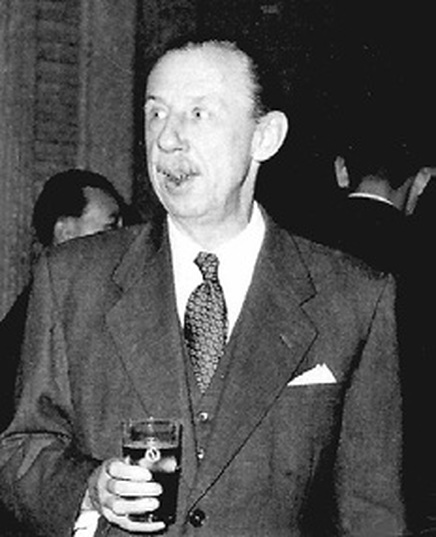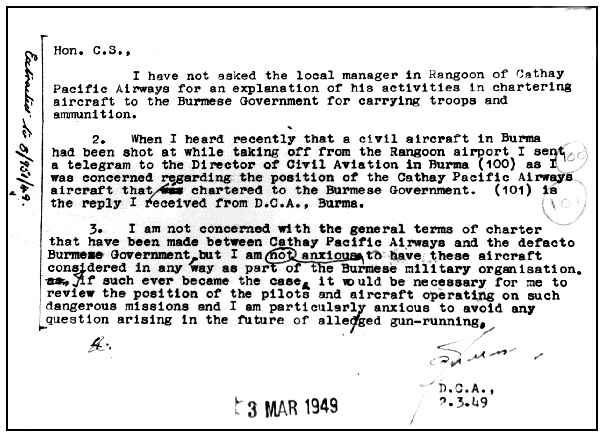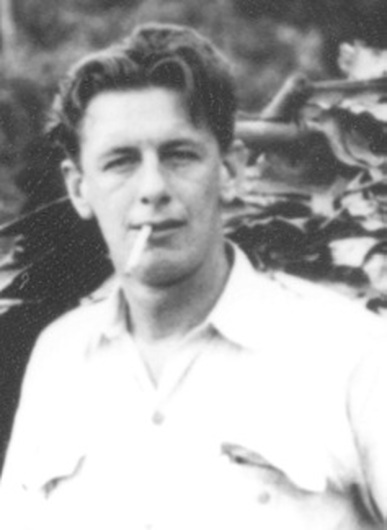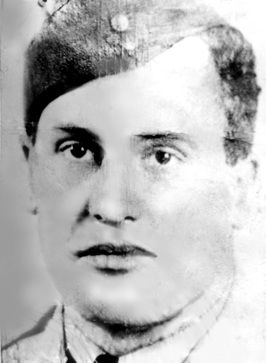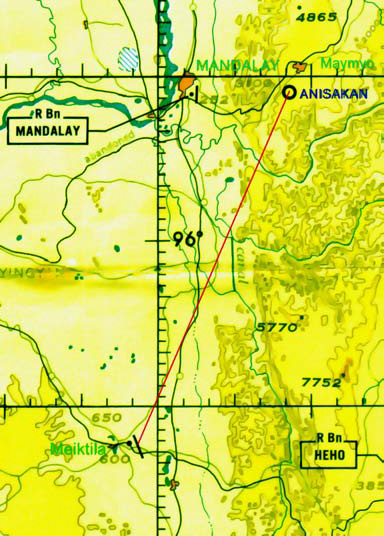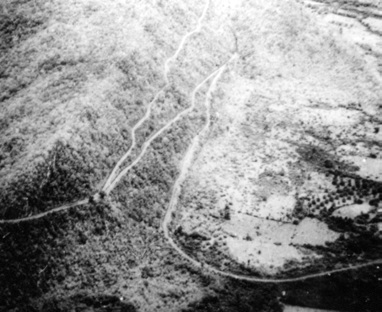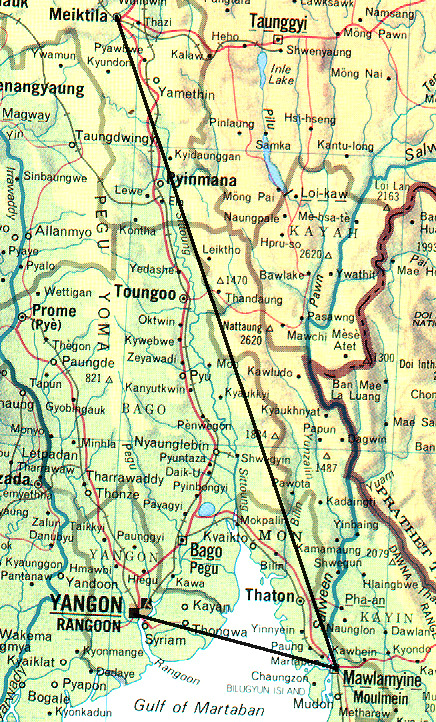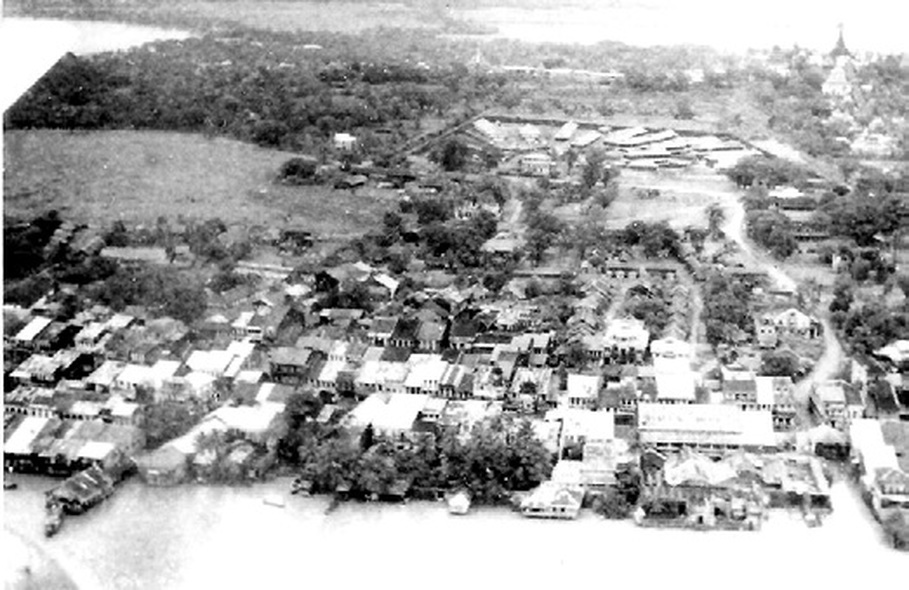Danger Money?
The Karen insurgency was at its peak. The government troops had no answer to its dedicated well-led forces, and large tracts of food bearing country fell to its advance almost daily.
In a matter of days the Karen army encircled Rangoon, severing all land borne communication. The remainder of the country was on its own. The Karens had gained control of the rice bowl that fed Burma, the vital Irrawaddy Delta. However, in the glory of their victories they failed to recognise the importance of Mingaladon Airport. They left it almost intact and although they over-ran it and held it for one night, their sappers did not devastate it. A few well-planted land mines would have decommissioned it for months, and it was this wasted opportunity that would finally bring the Karen uprising to its knees.
Whoever controlled the up-country airfields was of concern to air charter operators. Flights frequently left Mingaladon for a destination without knowing who controlled it, so the authorities devised a panel marking system they guaranteed solved the problem, while Karen intelligence often knew the sequence of the day and displayed it correctly. The aviator then entered a spidery parlour as an unsuspecting fly. At the beginning of March 1949
Maymyo fell to this ploy with serious implications.
At this time we were holding a daily lottery whose prize went to the crew with the most bullet holes in their plane’s airframe. The winners got a case of beer, which in a country short of life’s necessities had a low priority, and was a princely prize that soon attracted criminal intent.
Being an acknowledged teetotaller, my peers elected me one of three accredited scrutineers, but even at this early stage a group of devious men had their own agenda, and doubts arose when the same crew kept winning. Their plane resembled a patched sieve, and one day a scrutineer casually scratched a patch that fell off to expose unblemished skin. With the connivance of a beer addicted airframe engineer the crew had corrupted our lottery. We all felt betrayed.
It was a simple but devilish scheme, and our lottery went into liquidation with many a pondering brow clearly wishing they had thought of it!
We were undoubtedly involved in a shooting war, but lacked the knowledge to make an educated assessment of its danger. The fact that our licences were issued by an outside authority led to raised eyebrows in high places.
In a matter of days the Karen army encircled Rangoon, severing all land borne communication. The remainder of the country was on its own. The Karens had gained control of the rice bowl that fed Burma, the vital Irrawaddy Delta. However, in the glory of their victories they failed to recognise the importance of Mingaladon Airport. They left it almost intact and although they over-ran it and held it for one night, their sappers did not devastate it. A few well-planted land mines would have decommissioned it for months, and it was this wasted opportunity that would finally bring the Karen uprising to its knees.
Whoever controlled the up-country airfields was of concern to air charter operators. Flights frequently left Mingaladon for a destination without knowing who controlled it, so the authorities devised a panel marking system they guaranteed solved the problem, while Karen intelligence often knew the sequence of the day and displayed it correctly. The aviator then entered a spidery parlour as an unsuspecting fly. At the beginning of March 1949
Maymyo fell to this ploy with serious implications.
At this time we were holding a daily lottery whose prize went to the crew with the most bullet holes in their plane’s airframe. The winners got a case of beer, which in a country short of life’s necessities had a low priority, and was a princely prize that soon attracted criminal intent.
Being an acknowledged teetotaller, my peers elected me one of three accredited scrutineers, but even at this early stage a group of devious men had their own agenda, and doubts arose when the same crew kept winning. Their plane resembled a patched sieve, and one day a scrutineer casually scratched a patch that fell off to expose unblemished skin. With the connivance of a beer addicted airframe engineer the crew had corrupted our lottery. We all felt betrayed.
It was a simple but devilish scheme, and our lottery went into liquidation with many a pondering brow clearly wishing they had thought of it!
We were undoubtedly involved in a shooting war, but lacked the knowledge to make an educated assessment of its danger. The fact that our licences were issued by an outside authority led to raised eyebrows in high places.
In Hong Kong A.J.R. Moss sent a memo to the Colonial Secretary, seemingly more concerned with aircraft nationality than crew safety. His memo pointed out that aircraft displaying Colony registration must not be suspected as being part of any Burmese military adventure. He also made a thinly veiled charge that Cathay crew might be construed to be gunrunners.
Most of our charters brought food to beleaguered towns. Our payloads were primarily onions, potatoes, rice and ghee, that foul smelling clarified buffalo butter. After loading his DC-3 with the manifest goods Captain Ed Berry invariably added six bags of potatoes that he blithely declared were for Mum. With this profitable sideline he never used any part of his salary.
Neither our pay nor insurance cover was adjusted to compensate for these hairy conditions. When a crewmember broached the subject he found himself faced with stony silence or derision.
Neither our pay nor insurance cover was adjusted to compensate for these hairy conditions. When a crewmember broached the subject he found himself faced with stony silence or derision.
One afternoon we met in Bob Smith’s hole-in-the-wall office. The Agenda was to compose a letter to management expressing our concern that the Burma operation had reached dangerous levels. Without warning a 20mm Oerlikon shell pushed its snout through the wall. All present held their breath, and almost instantly, everyone had cleared not only the office but the hangar as well. After a time we decided that our letter was vital and returned to the menacing presence.
Bob Smith’s casual one finger typing reached subsonic speed and soon the letter lay ready for signing. Shaking hands scribbled mostly illegible signatures, but who cared! That afternoon Ceddie Carlton, the Angry Ant, bore it back to Hong Kong.
Later, when Bob decided the shell was a dud he carefully chiselled it from the wall and it became his doorstop.
Bob Smith’s casual one finger typing reached subsonic speed and soon the letter lay ready for signing. Shaking hands scribbled mostly illegible signatures, but who cared! That afternoon Ceddie Carlton, the Angry Ant, bore it back to Hong Kong.
Later, when Bob decided the shell was a dud he carefully chiselled it from the wall and it became his doorstop.
Our Operations Manager, Captain Dick Hunt answered the letter in person, and that night he loudly belittled our concerns. After ruining our evening he decided our mess standards added nothing to his exalted position, and removed his patronage to the luxurious Strand Hotel. We considered his departure a blessing!
On the morning of 5 March he arrived at Mingaladon to fly with Captain John Riordan. What better way to show his contempt than to do a flight up-country. As he arrived on the flight deck he contemptuously ordered Riordan to hop into the right-hand seat, then off they went to Meiktila.
The flight continued as the previous evening had ended with more lecturing about how bloody frightened you blokes have become, using every pretext to lever more money off a struggling impoverished company. His soulful plea brought moisture to Riordan’s eyes but retribution lay just beyond the horizon.
The flight continued as the previous evening had ended with more lecturing about how bloody frightened you blokes have become, using every pretext to lever more money off a struggling impoverished company. His soulful plea brought moisture to Riordan’s eyes but retribution lay just beyond the horizon.
At Meiktila the airfield signals were correct, indicating that the place was still under Government control. As he cut the engines, Hunt said, Look, John must be a VIP coming back with us. We’ve got a guard of honour. John looked and said, yes, we have, and they look like Karens. Bloody rot! scoffed Hunt.
Riordan merely shrugged, then went back to open the cargo door. As it swung open he got a precise salute from a diminutive officer whose serious expression spread to a wide grin as he said, I’m a Karen. I expected nothing less said Riordan, returning the salute. Then he excused himself and returned to the flight deck where he imparted the good news. In a subdued whisper, Hunt asked what should they do. Just what they bloody well tell us, the realistic Riordan advised.
The Karens locked the crew in a room, and later their guard tapped on the door and in plummy Oxford English asked if they had any special requests for dinner. Hunt said he wasn’t hungry but would appreciate a beer. John, testing what the traffic would bear, asked for medium rare a steak and a woman for dessert. Neither request surprised the guard who soon returned with a medium rare steak, a case of beer and two women. As the dawn came up like thunder the officer woke them with their orders for the day. He casually told them they were honoured for they were to help capture Maymyo. They would fly his troops to the airfield at Anisakan, from where his men would proceed to Maymyo five miles on. They would go at once!
What if we refuse? Hunt snarled. The still-smiling officer un-holstered his revolver, blew down the barrel, in a manner pleasing to the Western movie buff, said quietly, Now, Captain, I fervently hope you are not going to be difficult.
Maymyo is some 65 miles north east of Meiktila and just east of the legendary city of Mandalay. The hill-town of Maymyo became an oasis to a Raj community escaping the summer heat of the Irrawaddy Delta, but they earned their cool holiday by surviving a narrow road of frightening bends, and by 1949 the civilised traveller arrived by landing at the pocket-sized airfield at Anisakan.
On 7 March 1949, Hunt and Riordan flew two loads of Karen troops to Anisakan, and by the early evening Maymyo had fallen to the invaders. The casual way the Karens captured the airfield showed their superiority to the Burmans.
A few minutes after they landed at Anisakan they had full control of the airfield. A short time later an Airspeed Oxford of the Burmese Air Force touched down. The unsuspecting crew taxied in; cut the engines, and were led away under guard. Under Karen persuasion they revealed that a Spitfire would soon land. Still in Government uniforms, the Karens made things look lazy and normal, and the Spitfire pilot joined his colleagues in the brig.
Riordan merely shrugged, then went back to open the cargo door. As it swung open he got a precise salute from a diminutive officer whose serious expression spread to a wide grin as he said, I’m a Karen. I expected nothing less said Riordan, returning the salute. Then he excused himself and returned to the flight deck where he imparted the good news. In a subdued whisper, Hunt asked what should they do. Just what they bloody well tell us, the realistic Riordan advised.
The Karens locked the crew in a room, and later their guard tapped on the door and in plummy Oxford English asked if they had any special requests for dinner. Hunt said he wasn’t hungry but would appreciate a beer. John, testing what the traffic would bear, asked for medium rare a steak and a woman for dessert. Neither request surprised the guard who soon returned with a medium rare steak, a case of beer and two women. As the dawn came up like thunder the officer woke them with their orders for the day. He casually told them they were honoured for they were to help capture Maymyo. They would fly his troops to the airfield at Anisakan, from where his men would proceed to Maymyo five miles on. They would go at once!
What if we refuse? Hunt snarled. The still-smiling officer un-holstered his revolver, blew down the barrel, in a manner pleasing to the Western movie buff, said quietly, Now, Captain, I fervently hope you are not going to be difficult.
Maymyo is some 65 miles north east of Meiktila and just east of the legendary city of Mandalay. The hill-town of Maymyo became an oasis to a Raj community escaping the summer heat of the Irrawaddy Delta, but they earned their cool holiday by surviving a narrow road of frightening bends, and by 1949 the civilised traveller arrived by landing at the pocket-sized airfield at Anisakan.
On 7 March 1949, Hunt and Riordan flew two loads of Karen troops to Anisakan, and by the early evening Maymyo had fallen to the invaders. The casual way the Karens captured the airfield showed their superiority to the Burmans.
A few minutes after they landed at Anisakan they had full control of the airfield. A short time later an Airspeed Oxford of the Burmese Air Force touched down. The unsuspecting crew taxied in; cut the engines, and were led away under guard. Under Karen persuasion they revealed that a Spitfire would soon land. Still in Government uniforms, the Karens made things look lazy and normal, and the Spitfire pilot joined his colleagues in the brig.
The capture of the important hill town of Maymyo was little more than a walk in the park. As the defenders saw the Karens flitting from tree to tree they realised their inadequacies and fled into the jungle.
Hunt and Riordan made no further contribution to the Karen war effort. For two days the Karens treated them as honoured guests. They were driven to their DC3 to find it thoroughly cleaned, shining inside and out like a new pin.
The diminutive colonel autographed Riordan’s logbook then plucked off his artillery badge and pinned it on Riordan’s jacket. He removed Riordan’s Cathay Pacific wings and pinned them on his own breast as his men broke into spontaneous applause. Facing Riordan he said, When we capture Rangoon we’ll make you the first Marshal of the Karen Air Force. With a serious demeanour Captain Riordan accepted their accolades.
His words to Captain Hunt were in stark contrast. Captain, he said, I don’t like you. I am releasing you because your friend asked it of me, but don’t fall into my hands again.
A thoroughly chastened Hunt hastened back to Hong Kong where he reported that the Burma operation did entail a certain amount of risk. We all got a 50 per cent pay rise, plus 30 rupees an hour danger money.
Hunt and Riordan made no further contribution to the Karen war effort. For two days the Karens treated them as honoured guests. They were driven to their DC3 to find it thoroughly cleaned, shining inside and out like a new pin.
The diminutive colonel autographed Riordan’s logbook then plucked off his artillery badge and pinned it on Riordan’s jacket. He removed Riordan’s Cathay Pacific wings and pinned them on his own breast as his men broke into spontaneous applause. Facing Riordan he said, When we capture Rangoon we’ll make you the first Marshal of the Karen Air Force. With a serious demeanour Captain Riordan accepted their accolades.
His words to Captain Hunt were in stark contrast. Captain, he said, I don’t like you. I am releasing you because your friend asked it of me, but don’t fall into my hands again.
A thoroughly chastened Hunt hastened back to Hong Kong where he reported that the Burma operation did entail a certain amount of risk. We all got a 50 per cent pay rise, plus 30 rupees an hour danger money.

